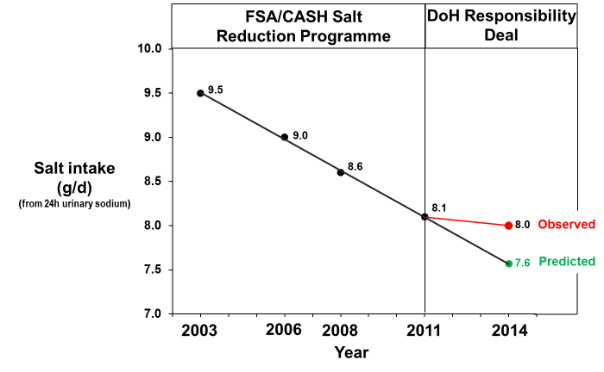RESPONSIBILITY DEAL FAILS TO DELIVER ON SALT WITH 9,000 (APPROX) LIVES LOST SINCE 2011
CASH Comment on the latest National Diet and Nutrition Survey: assessment of dietary sodium
Adults (19 to 64 years) in England, 2014

Figure 1. Published figures for average salt intakes in the UK since 2003 to 2014 [REF 1].
Unhealthy food supplied by the food industry is now the biggest cause of death and ill health in the UK. CASH calls for the government to immediately set up an independent agency responsible for nutrition to stop adding large and unnecessary amounts of salt, fat and sugar to our food.
The results of the latest National Diet and Nutrition Survey assessment of dietary sodium have been published highlighting that the UK population is consuming THE SAME AMOUNT OF SALT than it did 3 years ago (8.1g/day in 2011 vs 8.0g/day measured in 2014).
In the Public Health England press release [REF 1], they state that salt consumption was 8.5g/day in 2011, however the previously published result by the NDNS is 8.1g/day and they’ve used the same methodology in both 2011 and 2014. Between these years, there has been no fall in salt intake. It is unclear how Public Health England recalculated the result that was previously published at 8.1g/day to 8.5g/day.
The UK’s salt reduction programme, started in 2003 pioneered by the Food Standards Agency (FSA) and CASH, is considered a worldwide success and has been copied in many other countries. The programme involved a collaborative effort with the food industry to reduce salt in the nation’s diet. This was done by setting up specific salt targets in 2005 for 86 categories of food, with the aim of re-setting them every 4 years. Whilst the targets remained voluntary, close monitoring of the food industry was maintained throughout, ensuring no company lagged behind. As a result, significant reductions in salt intake were made at a population level, consequently reducing blood pressure and resulting in fewer deaths from heart attack and stroke [REF 2].
Unfortunately in 2010 under the coalition government, the FSA was forced to give up responsibility for nutrition by Andrew Lansley secretary of state for Health, who then set up the so called ‘Responsibility Deal’ where unbelievably he made the food industry responsible for policing themselves. This programme resulted as expected in the majority of companies not sticking to the targets that had been set, not being properly monitored and the deal is currently suspended. This is a national tragedy as for every gram of salt reduction saves approximately 6-7,000 deaths per year from strokes and heart disease, 4,000 per year of which are premature [REF 3].
Lansley’s decision to hand power back to the food industry as part of the flawed Responsibility Deal has lost 5 years of salt reduction, with a total loss of approximately 9,000 lives and a continuing loss of 3,000 lives per year, draining valuable NHS resources.
“This is a tragedy for public health. The food industry is the biggest and most powerful industry in the world. Most of the foods that it currently provides are very high in salt, fat and sugars, causing strokes, heart failure and heart attacks, obesity, type 2 diabetes and cancer. Cameron must take charge and set up robust mechanisms to control the food industry, with regulated targets for salt, sugar and fat. Without this, many more thousands of people will die and suffer unnecessarily, and it will be the final nail in an almost bankrupt NHS” says Professor Graham MacGregor, Professor of Cardiovascular Medicine at Queen Mary University of London and Chairman of CASH.
Everyone is at risk from the health effects of eating too much salt. Salt increases blood pressure and it is this rise in blood pressure that leads to thousands of unnecessary deaths worldwide from heart attacks, heart failure and stroke. Raised blood pressure is responsible for almost two thirds (62%) of stroke and half of heart disease (49%). High salt intake can also contribute to kidney disease, stomach cancer and osteoporosis and salt can have an indirect effect on obesity.
Most of our salt intake comes from the food we buy, with processed foods contributing to 75% of our daily salt intake. Reformulation efforts have until recently been proven successful in helping to reduce the population’s intake, with a 15% reduction from 9.5g in 2000/01 to 8.1g in 2011, but more must be done. It is estimated that reducing population salt intakes by just 1g will prevent 4,147 premature deaths and save the NHS nearly £300 million a year.
- ENDS -
Contact David Clarke @ Rock PR for more information. E: david@rock-pr.com
M: 07773 225516
REF 1 – Feng J He, Sonia Pombo-Rodrigues, Graham A MacGregor. Salt reduction in England from 2003 to 2011: its relationship to blood pressure, stroke and ischaemic heart disease mortality. BMJ Open 2014;4: e004549.
REF 2 – The Department of Health estimate that reducing population salt intakes by just 1g will prevent 4147 premature deaths and save the NHS £288 million each year.


